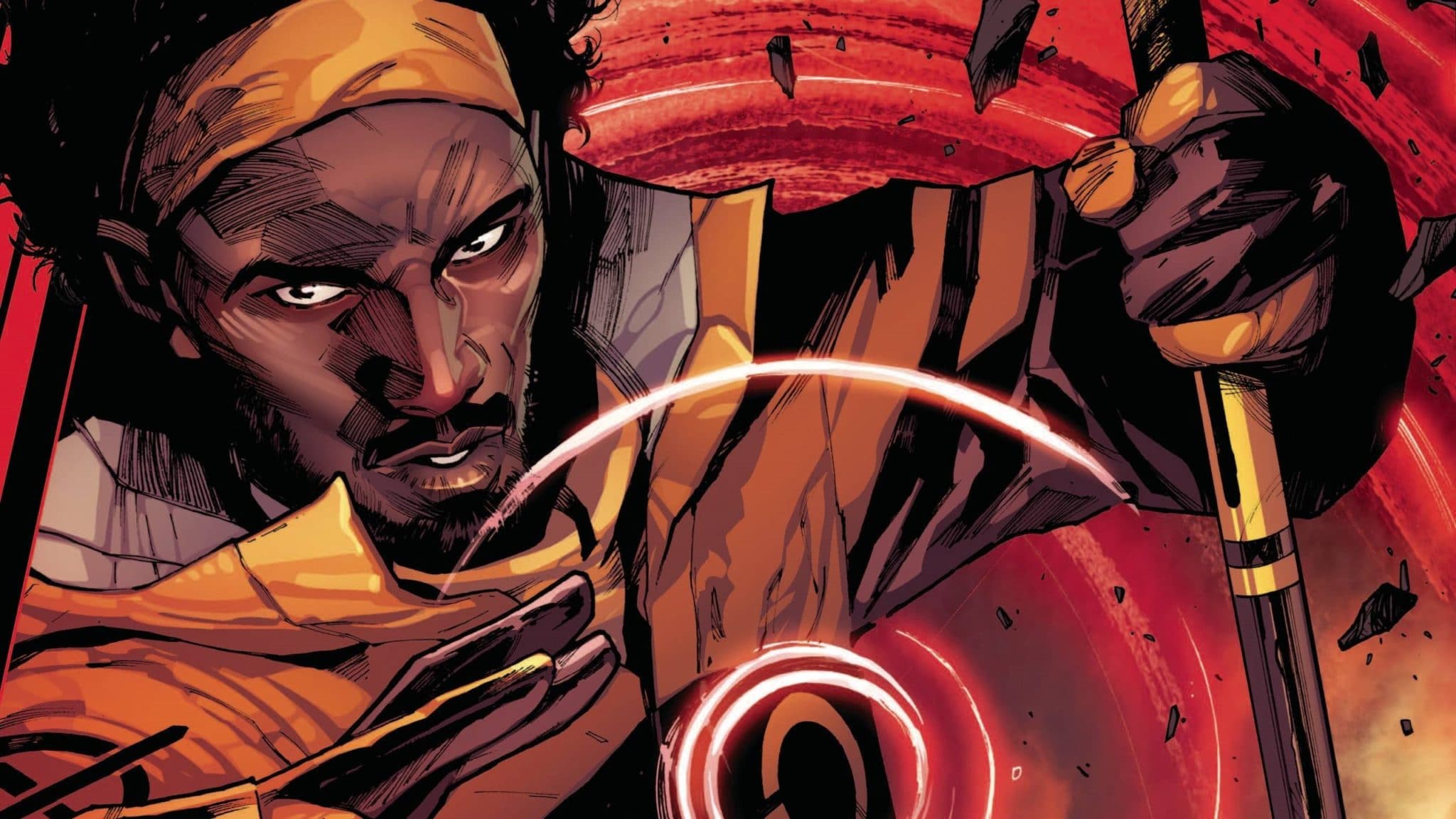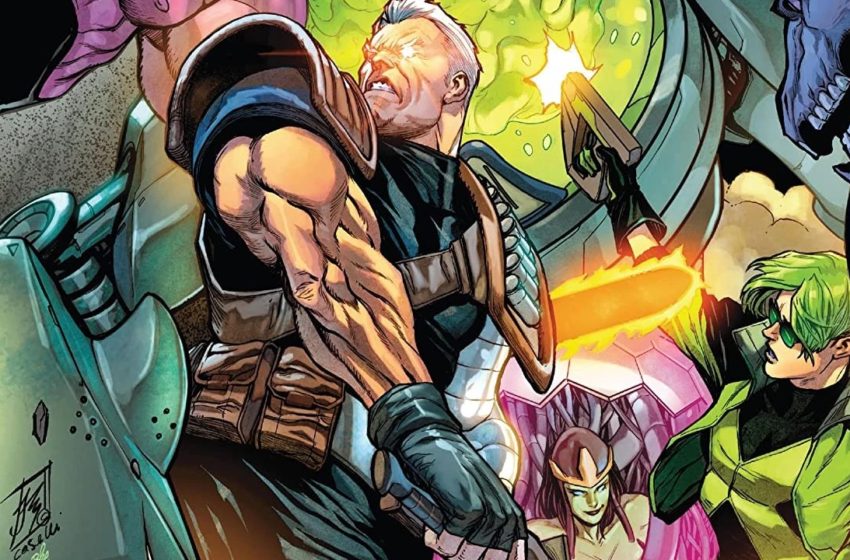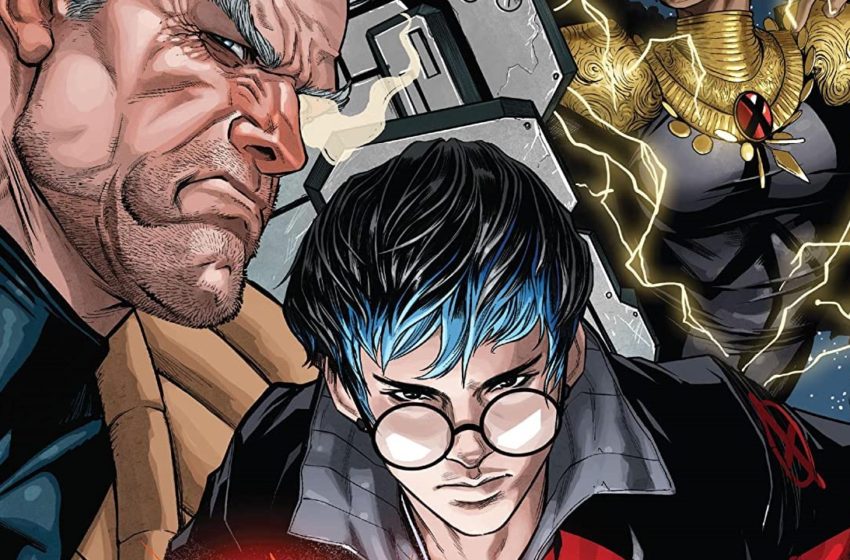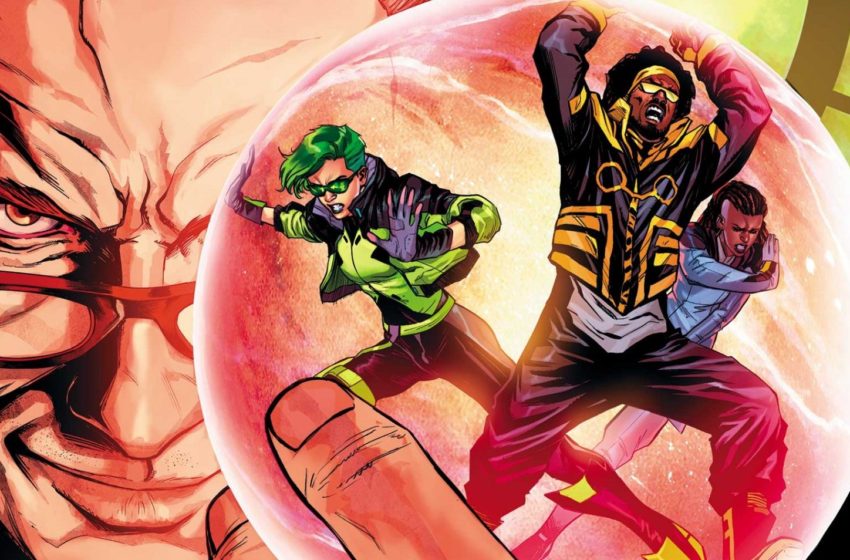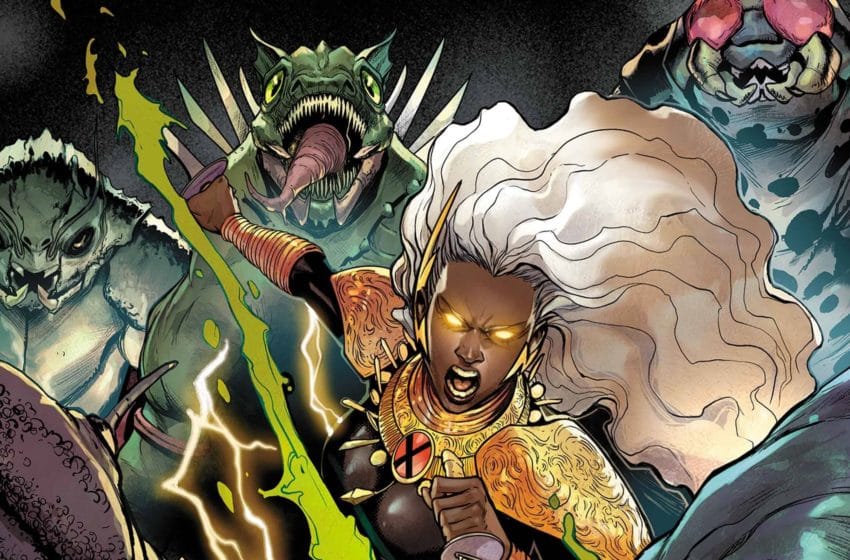Who is Eden Fesi? Who is the Manifold? Al Ewing, Valerio Schiti, Ray-Anthony Height, Bernard Chang, Nico Leon, Marte Gracia, and Ariana Maher walk on his wild side in S.W.O.R.D. #3.
Nola Pfau: Wow, that sure was a hell of a reveal this issue about Manifold, right?
Zach Rabiroff: Yeah, I know! You mean the way the issue totally redefined the nature of his powers in a way that forever changes his relationship to both his team and the entire universe, right?
NP: What? No, the fact that he’s obsessed with The Fifth Element.
Space Talker

ZR: One of the odd pleasures of this book is the fact that, three issues in, there’s really no telling what to expect from any given story. It’s not just because the title lasted all of 30 days before being waylaid by a Marvel Universe Crossover Event, it’s also because Al Ewing has almost willfully resisted any temptation to give the book a central protagonist or reader point of view. For our first two issues, it seemed like that figure might be team leader Abigail Brand, whose voice dominated the data pages structuring each story. Here, however, we detour for a character study-cum-travelogue of Eden Fesi, A.K.A. The Manifold of Earth 616.
Oddly enough, I think the issue is that much stronger for it. It’s a surprisingly sensitive look at the team’s universal traveler (don’t call him a teleporter!), and the fact that it manages to advance some of Krakoa’s key plotlines in some pretty shocking ways is just icing on the cake. And we were just one page away from not having even a single Goop Monster panel in this entire crossover story! But before we get into the nitty gritty of intergalactic negotiation, Nola, what did you think of our look at Eden here?
NP: Honestly I was really excited for it! He’s the kind of character I know of, but I didn’t really know anything about. Chris [Ed note: Eddleman, CXF editor, friend and garden dad] mentioned to me that he was used a lot in Hickman’s Secret Warriors, but that was a section of the Marvel Universe I never really delved into, because getting me to read anything that doesn’t have an X on the cover is basically a lost cause. I guess he joined the Avengers after that? I’m glad he came to Krakoa and stopped working for X-Men villains.
ZR: It’s always nice when criminals can reform and become productive members of society, even when they’ve sunk so low as to work for Tony Stark. See? The system works.
But, yes, Manifold has always been Jonathan Hickman’s personal substitute for his mentor Gateway, and despite the capacity for greater stretches of dialogue, he’s historically functioned the same way: which is to say, more as a convenient plot device than as a character in his own right. It’s not that Hickman, Coates, et. al. have been deliberately dismissive of him, and he certainly never reached the level of unintentional satire that Gateway did during my beloved Outback era of Uncanny X-Men where Claremont created him as character of color who not only existed solely to serve the needs of the heroes, but whose entire hook was that he did not speak a word while working for them. Despite a few stabs at fleshing out Eden’s background and motivations, we’ve simply never had the chance to get a sense of what drives him, or what his ongoing conflicts and concerns might be.
NP: Well, nothing drives him. He walks!
As a side note, there’s something that doesn’t quite sit right with me here. It’s a tricky subject to tackle, because neither of us are BIPOC, but there’s something about Manifold being a Black mutant from Australia who was up until now considered to be a teleporter, under his mentor Gateway, also a Black mutant from Australia. There’s this thing that happens in fiction, but specifically fiction by white people, where Black people all know each other, or are related, or always have something to link them together. I see echoes of that here, and given the oft-discussed problems of Gateway’s original characterization under Claremont (not to mention Claremont’s general problems with race during his long tenure on the X-Men), plus the fact that Manifold here was also created by a white man and is currently being written by another…it’s a thing that makes me nervous, you know?
ZR: It’s a really good point, and in some ways it’s a compounding of the general comic book compulsion to make every character related to every other character over time (remember that time Sandman turned out to be related to Norman Osborn on the basis of their identical haircuts?). That’s probably just a side effect of endless comic book continuity, but it’s made more troubling by the fact that there are many, many fewer BIPOC characters and those that exist are too often reduced to the barest two-dimensional sketches of characterization.
Consequently, people like Gateway and Manifold are identified only by their relationship to one another, rather than by any agency or defining motivation. As you point out, the fact that Manifold’s principle writers have been mostly white [Ed. note: with the notable exception of Ta-Nehisi Cotes] creates a certain sense of unease in this area. I’m heartened to see that, here at least, Ewing is trying to take the first steps toward building out the character into a life of his own.
The opening sequence in this issue, when we see him first communing one-on-one with the universe and then returning to his Outback home to center himself before his voyage outside the galaxy, was both illuminating and quietly moving. Ewing’s dialogue in this sequence is lovely and understated, driving home the somewhat awkward distance that’s developed between Manifold and his people over time. He’s still one of them, and he still wants to connect with the place he calls home, but how much can he really share with them now that his life has taken him so far from his origins? He’s like a heroically exaggerated version of every twentysomething who returns to their hometown after spending a few years living it up in the big city. In this context, the final knife-twist of dialogue in the scene, in which Eden reassures his friends that Krakoa is on the side of good by telling them of the law to “respect this sacred land,” prompting the response, “…They still had to make it a law…”, is subtly devastating. Eden may wish to understand his elders, but he has crossed a gulf that may be too far to bridge.
NP: That line about it having to be a law is competing with the Fifth Element reference for my favorite bit of the entire issue. I was taught in high school by a (admittedly very conservative) history/social studies teacher that every law made is a freedom restricted, and while that idea is essentially true, it’s easy for it to be misinterpreted as the idea that laws are bad inherently, but society is more complicated than that. Sometimes you gotta stop people from doing bad, or stupid stuff! It’s like warning labels on certain things telling you not to stick your hand into the wood chipper, or whatever. Those labels exist because people keep sticking their damn hands into wood chippers. It’s good that a law exists to keep mutants from disrespecting land, but it’s bad that that law has to exist, because they won’t simply treat it with respect otherwise.
ZR: It reminds me of a high school history teacher I once had who pointed out that our impression of the New England Puritans as prudes was entirely backward: all those laws and arrests over dancing and cohabiting and fornication were proof that people were doing it all the time, to the point that a whole legal code was necessary to prevent it. Krakoa may have its heart in the right place where the environment is concerned, but its starting point is still a sense of ownership born from industrial capitalism, and that doesn’t easily disappear.
That also relates to the nature of Manifold’s powers, which Ewing clarifies here based on hints and suggestions from Hickman’s earlier runs. The distinction between teleportation and, uh, manifolding is a clever bit of comic book science sophistry, but it’s one that tells us something vitally important about Eden and his culture. A teleporter makes demands on the universe – they treat their power of transportation the same way Cyclops treats his optic blast, as a bludgeon to be propelled through space and time with brute force. For Eden, however, each use of his powers is an act of communion with the universe around him: as he tells it, “it’s not ‘telling.’ It’s ‘asking.’”
As far as SWORD is concerned, that’s both a blessing and a curse. On the one hand, it gives him (presuming the universe obliges) nearly unfathomable power over space and time itself – indeed, there’s not much to differentiate him from proper reality-warpers like Jim Jaspers or Proteus. But on the other hand, that power depends wholly on his sense of connection to what surrounds him. It’s important both literally and metaphorically that Eden needs to see the stars to place himself before navigation: he needs a starting point, a place in which he can take root, before he can move the universe on its fulcrum. Stay in touch with those roots, as he does here in his trip to his Outback home, and there’s no stopping him. But if he loses sight of where he came from (as, say, a person might when they’ve adopted a new nationality on top of their previous identity, and then joined a star-spanning secret organization independent of earth-based authorities) and his great power could become an even greater catastrophe.
Space Walker

NP: Of course, what’s significant here isn’t just how Eden’s powers work, but where he decides to go with them. There’s the visit to acquaintances in Australia, sure, but there’s also a visit to deep space, and the planet-less, roving force of the Snarks [Ed. note: also referred to as the Zn’rx]. He’s got an offer to make for them, and whew, was this a charged scene for me. How’d you feel about it?
ZR: There are cutthroat negotiations, and then there’s the truly astonishing offer that SWORD makes to the Snark prince Djagyar here. The Krakoans are willing to give up (with their obliging consent) two of their own, Burner and Lifter, so that the Snarks can make use of them as weapons in their war of succession. The point, which Djagyar himself doesn’t quite grasp, is that the ultimate sacrifice for Krakoan mutants is not their lives but their powers – that painful, symbolic reminder of a time when mutants were oppressed victims stripped of their place in the world.
It’s not a permanent sacrifice, and Eden even takes care to note that death is the preferred option under the circumstances, since it saves the captives from going through the rite of the Crucible to return to their empowered state. But it still felt chilling despite that. Between this and Protocol V last issue, I think we’re starting to see SWORD take on a role that isn’t far removed from X-Force in the level of moral compromise necessary to secure the survival of their people. What was your take on it?
NP: It was a wild, wild offer, and it put me in mind of two things. The first is that it does a better job than anything Donny Cates has ever written to set the stakes of King in Black as an event, and the second is exactly what you mentioned, the similarities between SWORD and X-Force as operations concerning Krakoan security. It’s a role that the organization is familiar with, because it previously operated in a similar way with SHIELD, but I think the more fascinating thing about this, now that it’s got me thinking about it directly, is the fact that Krakoa’s two clandestine agencies are being operated by exes. That is dishy, and I hope it comes up.
I also really loved Djagyar’s reaction to this offer—maybe loved isn’t the right word? He’s terrible about it, but in a very enjoyable way. He rejects it summarily, because to his mind, his fleet’s strength is their lack of a homeworld; he even brings up the example of his sister’s failures to highlight that. “Let the enemy eat all of my potential allies” is…certainly a tactical stance one could take.
ZR: It’s kind of a parable about nationhood, if you want to read it that way, which connects to what we were saying earlier about Eden needing to know where he stands before he can move the universe around him. The mutants have built their collective identity around a homeland, and they are willing to pay any price to protect it. Djagyar sees rootlessness as an asset, and endless war as a strength. And for this, he pays the ultimate price. That’s actually quite the brutal twist ending to this scene, considering it advances a Guardians of the Galaxy plotline in a major way in a title pretty far removed from that storyline. Did you feel like the interlinked continuity in this scene made sense in the context of an X-Men book?
NP: I didn’t actually know it was interlinked continuity! Like I said, I don’t read anything that doesn’t have an X on it, because I frankly don’t have the time. I had no idea this was related to a GotG thread, but if so, that’s even better! I love this sort of thing; it’s the way continuity should be handled. I shouldn’t have to jump from book to book to follow an event, but a minor character getting assassinated in a corner where no one’s looking? That’s great stuff. It shows a world (or galaxy, universe, whatever) where events have consequences.
ZR: Yeah, I agree completely. There’s a genuinely intimidating list of continuity connections being dropped throughout this issue, which it is my curse to recognize because I must read everything compulsively forever. A short and probably incomplete list of referenced series here would include, obviously, King in Black and Guardians of the Galaxy, along with Immortal Hulk (where we discovered Henry Peter Gyrich’s new role as director of Alpha Flight), plus casual but important name-drops to Ta-Nehisi Coates’ still-unfinished Intergalactic Empire of Wakanda story in Black Panther. It’s extensive and potentially bewildering, but for my money it’s all handled with a light enough touch not to overwhelm the story Ewing is telling. It has the effect of giving readers the sense of a larger, interconnected universe without demanding they know everything about it. Suffice it to say, this is the kind of tied-together storytelling I most enjoy, even if it wouldn’t kill the editorial team to throw in a helpful footnote here and there.
Space Gawker

NP: Eden of course has a helpful footnote of his own, as his next stop—the Alpha Flight space station to visit the aforementioned Henry Peter Gyrich—clues him in to the fact that Gyrich has been turned, and is working for Orchis, the human supremacist organization most famous so far for operating a giant sentinel head that makes more sentinels in the orbit of the sun. My real question here is can it be considered that he’s “turned,” when Gyrich’s whole deal is that he’s always been a jerk who hates mutants? If anything this is just him sticking to his script.
ZR: That was my thought about Gyrich exactly, with my first reaction to this scene being “this is a huge surprise!” and my second being “this is literally the only choice that character could possibly have made with his life!” I’ve been writing about Gyrich over in our Immortal Hulk column lately (because that smarmy little bigot is as inescapable to me as he must be to the residents of the Marvel Universe), so I’ll say here a point I’ve been making: Gyrich’s gradual transformation from stick-in-the-mud bureaucrat to impossibly obsessed racist ideologue is a four-decade process that feels disgustingly natural. He’s a reflection of every real-life right-wing politician who has moved from principled conservatism to unbridled authoritarianism with such baby steps that even they haven’t realized all the lines they crossed. But at this point, there’s no going back: Gyrich has thrown in his lot with an organization that Magneto once compared to the Nazi-recruiting Operation: Paperclip, and the fate of mutants rests in his hands, along with those of whoever the redacted Orchis leadership on that document turns out to be.
NP: God, what if one of them was Val Cooper. Wouldn’t it just fit? Doesn’t she just make sense as a Karen? [Ed. note: Some of Val’s best friends are mutants!]
Your call of Gyrich as a perfect analogue for a right-wing politician is dead on, right down to his foolishly printing out incriminating documents, and then having the contents of those documents being seen literally as he’s pretending he isn’t that foolish. I really liked what was going on here art-wise, though. It’s obvious this issue has some big info drops for Eden’s powers, even if I wasn’t terribly familiar with him before now, but I enjoyed the way those powers were depicted, from his using a peephole to spy on Gyrich (if a little ostentatiously placed, but I suppose that heightens the drama) to the way he uses them to create a flashlight in his hand so that he can read those Orchis papers. It’s really inventive stuff.
ZR: It’s great visual inventiveness, and a terrific reflection of what we’re told in this issue about the nature of Eden’s powers: Schiti, et. al. make the universe itself appear as a supporting character around Manifold every time he uses his powers, in a way that makes it clear it, and not he, is setting the ground rules for how they operate. It’s even more impressive since there’s an unusually long list of artists involved in this issue – and, indeed, I think the seams do show a bit, with the earthbound opening sequences looking much more detailed and realistically rendered than the rest of the issue, and the Snark scene in particular coming off a bit sketchy. To that end, I should say a word of praise for the work Marte Gracia is doing on this series: the color palette of cosmic purples and blues (contrasted with the warm, golden tones of the Outback scene) knits together art that otherwise might have been somewhat jarring over the course of the issue. And it allows that closing shot, where we finally return to the…sigh…Knull plotline developing in the background these past months to pack the wallop it needs.
NP: Hey, if Cable has a cape, does that make him Capable?
No but really, Knull sucks, King In Black sucks, get it out of my X-Men pleeeeeeeeeeease.
X-Traneous Thoughts

- What do you think the odds are Broo and the King Egg stuff is gonna play out in SWORD before long?
- Google defines an orchis as an orchid plant “characterized by a tuberous root and an erect fleshy stem,” and boy are those some words I’ll never get un-associated with Henry Peter Gyrich now.
- This is actually in line with my theory that he’s just comics’ answer to the EPA guy from the Ghostbusters movies, who famously was also referred to by a word for a fleshy stem.
- Krakoan Reads: COCOON

